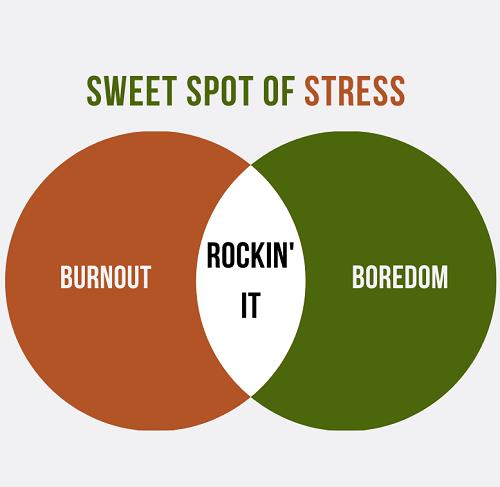April is Stress Awareness Month. So why am I writing about it in February? Because stress is a round-the-clock, round-the-calendar part of the human experience. (Am I the only one sick of “awareness months?” They are usually about something we are already abundantly aware of.)
A common misconception is that we need to eliminate stress (as I wrote about previously.) The truth is that struggling in life isn’t an option, it’s a requirement.
The good stress – “eustress” – keeps you focused, on your game, and doing things that matter to you. The bad stress – “distress” – is inevitable at some point for all of us.
Ideally, we periodically get hit with some negative stress, we handle it, recover to normal, manageable levels of stress, and life hums along. Increasingly, life is less than ideal.
Stress used to be in the form of immediate threats to our survival. (“Is that tiger going to eat me?”) But now, the stresses are vague, long-term, and can’t be handled by a physical response. (“My retirement fund is doing terribly.” “How will I pay for college for my kids?”)
But your brain and body only knows how to respond to stress with one set of options: the “fight, flight, or freeze” response you’re likely familiar with. These are ill-suited for stresses of modern life.
Your body gets pumped for action, and your brain starts alerting the attention and memory centers of the brain to heighten awareness of the stress.
Acute stress is something we deal with in a relatively short period of time – hours or days at the most. Chronic stress is anything that creates a stress response in your body for an extended period of time – weeks or months.
The problem is when stress becomes chronic. Scientists don’t know exactly when the transition occurs from stress that builds up to stress that tears down, but they sure do know the effects when they see them.
Stress hormones (adrenaline, noradrenaline, and cortisol) really like your hippocampus – the part of your brain that, among other things, plays a big role in memory. If stress hormones get high enough for long enough, they can take over your memories, encoding even non-stressful events as stressful. (Think of the war veteran who hears a firecracker and experiences a stress response like he was still in combat.)
Even worse, in excess amounts, stress hormones, can kill off the proteins that are designed to protect your brain from damage. And with no nerve endings in your brain, you can’t feel the damage like you feel a sprained ankle.
The “feeling” of stress you experience is essentially the emotional echo of the underlying stress on your brain cells. With chronic stress, the brain gets locked into the same pattern – typically one marked by pessimism, fear, and retreat from life.
Normal events start to be perceived as stressful. And the overabundance of stress can start to block access to existing, well-established memories. (Think of stories you’ve heard about someone who panics while driving and steps on the gas instead of the brake pedal.)
Effective stress management does not involve eliminating stress. It involves two components:
- Reducing the stress to eustress levels and acute distress events (like your car breaking down.)
- Re-taking control of your body’s response to stress.
The second one is best done with, you guessed it, exercise. It provides a distraction, reduces muscle tension, builds brain resources, teaches you a different outcome to a stressor, reroutes your brain circuits to take action when stressed instead of “wait and worry,” and it sets you free (if you’re locked into a chronic stress pattern you feel anxious and restricted.)
One caveat though: If you’re dealing with an excessive chronic stress load, your exercise efforts should not be at high intensity as very challenging workouts are another form of stress on the body so you don’t want to have workouts that “tear you down.”
Hitting the “sweet spot of stress” involves allowing enough stress into your life to give you purpose, meaning, and direction for your energies and efforts while avoiding getting locked into a chronic pattern of chronic stress that will tear down both your brain and your body.

